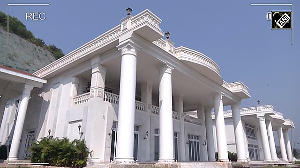Pakistan President Pervez Musharraf has run out of options in the fight against pro-Taliban tribesmen along the country's rugged western borders with his tactics alternating between military action and peace overtures, a media report said on Monday.
No approach has worked and at the heart of Musharraf's predicament is the failure of his plan to pacify the tribesmen in Waziristan with a peace accord, the Newsweek said.
In September, the Pakistani government signed a controversial truce agreement, ending a three-year-long military campaign in troubled North Waziristan in return for a pledge by tribal leaders not to give shelter to foreign fighters.
But in effect, the deal only empowered the local Taliban, who have been actively involved in the Afghan insurgency, the report said. Pakistani officials, however, insist that the ceasefire should lead to economic development in Waziristan and elsewhere.
Islamabad plans to invest millions of dollars in improving infrastructure, as well as the health and education systems, in the tribal areas, which may also help to create jobs for the tribesmen. Poverty, the report notes, is the fuel for militancy in the border regions.
Less than 30 per cent of the tribesmen attend school of any kind. And of those who do, 90 percent drop out of primary school.
But Newsweek said Musharraf's 'policy of appeasement' does not seem to be working. Far from taming the cross-border violence, the Waziristan truce appears to have contributed to deteriorating conditions in the eastern Afghan border provinces of Khowst, Paktia and Paktika, it said.
The report quoted US and Afghan officials as saying that the truce has made it easier for militants to send fighters and weapons across the border. Musharraf appears to be back into military action.
It was change in his tactics that resulted in the missile attack, which reduced a seminary in Chingai, border village in the Bajaur tribal area, into a huge pile of rubble, killing some 85 people in the single deadliest operation launched by Pakistani forces against suspected militants in the country's lawless tribal region.
Pakistani military officials say the madrassa was being used to train suicide bombers for attacks in Pakistan and Afghanistan but the missile strike provoked a strong backlash in the border region and the news magazine said it exposed a troubling reality for Musharraf that he has run out of options.
It quoted a senior Pakistani security official calling the bombing a 'major counter-terrorist operation' carried out on the basis of intelligence provided by the US.
US drones, the magazine said, had picked up unusual activity roughly 100 men undergoing some kind of guerrilla training in the compound. A high-resolution camera also detected a middle-aged bearded man delivering a lecture to the trainees.
US and Pakistani intelligence officials suspected he could be al-Qaeda No 2 Ayman al-Zawahiri or fellow jihadist Abu al-Obaida al Misri, the report added.





 © 2025
© 2025